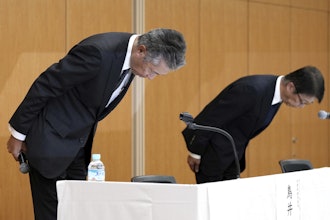
McDonald’s investors will consider a proposal for a civil rights audit of the company after the federal government denied McDonald’s request to remove the proposal from the agenda at its annual meeting.
SOC Investment Group, a shareholder advocacy group that supports union pension funds, submitted the proposal for a vote at McDonald’s annual meeting. The proposal, which is one of 10 listed on McDonald’s proxy statement, asks McDonald’s board to oversee a third-party audit that would analyze the company’s civil rights record and provide recommendations for improvement.
SOC backed a similar proposal at Apple’s annual meeting in March. Apple shareholders voted in favor of a civil rights audit over the Cupertino, California-based company’s objections.
McDonald’s annual meeting hasn’t yet been scheduled but is generally held in May.
In its proposal, SOC noted more than 50 complaints and lawsuits alleging sexual harassment at the company’s restaurants over the last six years. It also said multiple lawsuits against the company have been filed by Black franchisees and executives accusing the company of discrimination.
SOC also faulted the company for reporting diversity data only for its company-owned U.S. stores, even though 95% of its stores are owned and operated by franchisees.
“We urge McDonald’s to assess its behavior through a civil rights lens to obtain a complete picture of how it contributes to social and economic inequality,” SOC wrote in the proxy statement.
In a letter sent in January to the U.S. Securities and Exchange Commission, McDonald’s asked to remove the proposal from its proxy statement because publicly reporting on its civil rights record could harm its legal defense in multiple lawsuits.
The Chicago-based company also noted its ongoing efforts to promote diversity, including a $250 million commitment to increase the number of franchisees from historically underrepresented groups and new requirements for anti-harassment training at its stores worldwide.
The company said it has also set a goal of gender parity in its leadership positions by the end of 2030.
But in a letter sent to McDonald’s Corp. and SOC this week, the SEC turned down McDonald’s request, saying the proposal goes “above and beyond” McDonald’s legal matters and should remain on the proxy statement.






















